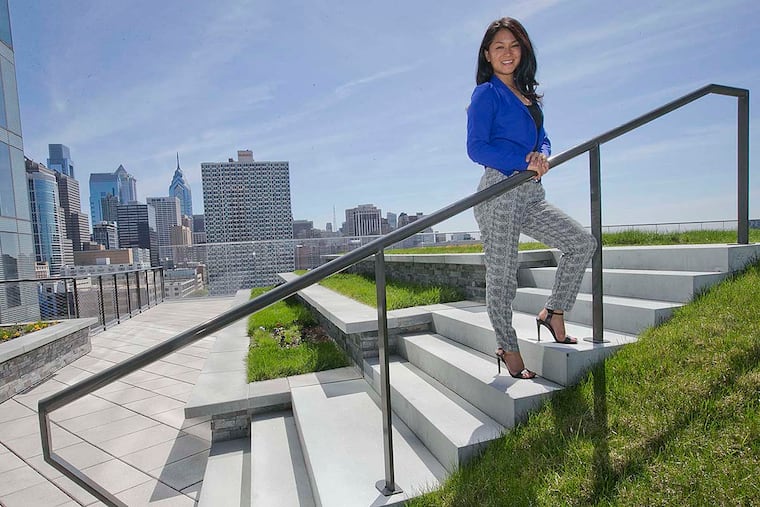A summer trip inspires a sustainability-based travel business
This story of entrepreneurial intrepidity can, in part, be traced to a hemorrhoid-treatment procedure. Melissa Lee witnessed one as a high school student who had convinced a family physician to let her tag along to see what being a doctor would be like. She promptly decided it was not for her.

This story of entrepreneurial intrepidity can, in part, be traced to a hemorrhoid-treatment procedure.
Melissa Lee witnessed one as a high school student who had convinced a family physician to let her tag along to see what being a doctor would be like. She promptly decided it was not for her.
Neither, she decided, was "cubicle life," after she spent the end of her senior year interning in the finance department at Bank of New York/Mellon, where her father works.
Her calling to start a business instead came while Lee was a sophomore at Rutgers University-New Brunswick, where she helped form the Rutgers Entrepreneurial Society. All that networking with business-minded students got Lee and a couple friends thinking: "Maybe this is something we should try on our own."
In what was not an entirely logical next step, they went to Costa Rica on summer break in 2009, "looking for opportunity, whatever that meant," Lee recalled recently.
As it turned out, it meant having most of their possessions stolen from the trunk of their rental car. But it also meant finding the seeds for what is now the GREEN Program, an innovative six-year-old travel company based in Philadelphia and aimed at inspiring more awareness of sustainability and activism, primarily among college students.
An increasing number of colleges and universities are offering academic credit for participants.
Annual revenue at GREEN (Global Renewable Energy Education Network) has surpassed $1 million; there are five full-time employees. Earlier this month, it was ranked 2015's top summer study-abroad program by StudyAbroad101, believed to be the largest and oldest review website for that industry.
Currently, the GREEN Program offers trips to Peru, Iceland, and Philadelphia, usually lasting eight to 10 days and averaging $3,700 per person (not including airfare). Lee, who bought out the two other founders, has a goal of expanding to 10 destinations within five years.
"There's so much more to be done, but that's the exciting part," said the 26-year-old resident of Old City, described by her mother, Michelle, as "very, very driven" and someone who daily "wakes up with a purpose in life."
Evidently, even on vacation.
During that summer trip to Costa Rica in 2009, Lee's hotel was next to a wind farm. Curiosity led the communications major with a double minor in theater management and organizational leadership to ask its operators for a tour.
"It kind of lit something under my butt," she said of her experience inside a turbine. Over two weeks, she and her friends would visit a variety of renewable-energy facilities: geothermal, hydro, biomass, solar. In between, they floated in the Pacific and zip-lined through lush forests - and were inspired to roll it all into a business, now a certified benefit corporation.
Since the first paying tour - 15 students sent off to Costa Rica in January 2010 - the GREEN Program has had more than 1,700 customers, mostly students, representing 470 universities and originating from 70 countries, Lee said.
Also offered once a year is a "professionals" program that typically attracts travelers age 30 to 55.
Elizabeth Killough, director of Untours Foundation, a Media-based organization that provides financial assistance to socially minded small businesses, called Lee "an entrepreneurial prodigy" who is "filling the energy pipeline with inspired engineers and advocates who are our main hope for getting us off our dirty-energy addictions." Untours has lent $50,000 to the GREEN Program, profitable since its first year, to help fund expansion.
Dan Conner was the first non-Rutgers student to sign up for a GREEN Program trip. It was in summer 2010, while Conner was a mechanical-
engineering major at Pennsylvania State University.
"One of the more powerful things about the GREEN Program is we got exposed to the environment [too], out hiking, tubing, going through nature reserves, experiencing the environment itself, and not just going to a geothermal plant and saying, 'This isn't burning fossil fuel,' " said Conner, now 26 and working at Precis Engineering in Ambler.
"We got to appreciate why that's important - because we're protecting the jungles we just walked through," Conner said. "It added a dimension I think is lost when you're reading about sustainability and CO2 reduction."
Jeffrey Brownson, an associate professor of energy and mineral engineering at Penn State and a solar researcher, was part of a team of faculty members who went to Iceland to research the GREEN Program there.
So impressed were they that the school's College of Earth and Mineral Sciences now offers financial assistance to 12 students a year to give them similar opportunities in Iceland, he said.
"A lot of our students really find passion in these travels," Brownson said. "It's a change-the-world perspective, but from that much more pragmatic, millennial-age-group perspective."
Full descriptions of all GREEN programs can be found at www.thegreenprogram.com.
Including Philadelphia as a GREEN Program destination last year, which includes a visit to the green "park" atop the Cira Centre, among other things, "demonstrates that we are leaders in fighting climate change and making our city a healthier, more resilient and sustainable place to live," said Christine Knapp, the city's new director of the Office of Sustainability. "There are numerous ways for young people who want to make a difference to find a sustainable career in Philadelphia."
Lee is part of the proof.
215-854-2466@dmastrull